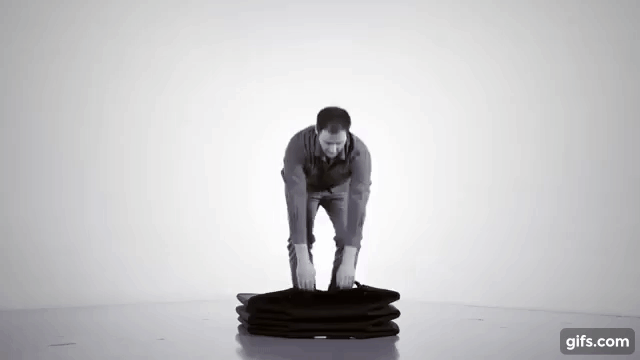John only pays $750 a month rent in Toronto. Can he afford a place of his own?
John, 33, has been living with his roommate and best friend for several years in a Little Italy apartment. Rent is low and John has had little incentive to move out.“We moved in together in our 20s and with rent going up around the city, moving out of our apartment seemed like a bad move,” John says.While his $750 a month is a great deal compared with other exorbitant rents in Toronto, John is starting to feel like it’s time to move out on his own but he doesn’t know what to expect.“I’ve had the same routine and habits for a while,” he says “but I’m 33 and it just feels like something I should do now,” he says.John is part of Toronto’s theatre community and makes $3,700 a month on average depending on the jobs he gets and other freelance work. He admits that he tends to lose track of his spending and has $3,000 in credit card debt.“I know I eat out too much but I’m literally always hungry,” John says. “I try to eat breakfast at home though and I’m not a fan of coffee so I guess that helps.”Can John save up enough money to move out on his own? We asked him to share two weeks of spending to get a better idea of his expenses.The expert Jason Heath, managing director at Objective Financial Partners:John has been living with a roommate for a while and wants to get out on his own. The challenge is he has a variable income that barely covers his spending as it is. He wants to know how to save up and what else he needs to know.John’s current rent is $750 a month and if he moves and pays current market price for a studio or 1-bedroom, he could be paying $2,000 a month. That increase of $1,250 a month is substantial. Even if John could save up $10,000 or won it in the lottery, that would only cover 8 months worth of excess rent. He may also need new furniture to fill a bigger apartment and the utilities or insurance could rise. So, I think the solution is less about saving up and more about finding a way to consistently spend much less than he earns.You can only boost cash flow one of two ways — you can increase your income or decrease your spending. Decreasing spending is easier than raising your income. John has a lot of discretionary spending. Most of his costs for the two weeks he tracked were for going to the bar, going to movies, and food delivery. He says he is always hungry and ends up eating out too much.If he wants a place of his own, he may need to opt out of the occasional social event or start cooking more at home. If that is not in the cards for him, he may need to take on more freelance work or get a part-time job to supplement his variable income as a writer, performer, and director.John has $3,000 of credit card debt and I think that should be his first priority. If he cannot get rid of that and then consistently save an amount equivalent to the $1,250 increase in rent to move out, he is just going to go into debt living on his own.In the long run, he is also going to need to save some money for retirement. This may be tough to do in your 30s, but it will be even harder if he runs up more credit card debt by moving out prematurely and has to pay that off in his 40s. Your 30s are a pivotal time to avoid increasing your consumer debt for the benefit of your future self in your 50s, 60s, and beyond.Results: He spent more. Spending in week one: $295. Spending in week two: $346.50How he thinks he did: John says his spending was higher than usual in the second week because of his busy work schedule and a close friend’s birthday celebration.Take-aways: It was hard for John to confront his spending habits head on but says he appreciates Heath’s advice and the exercise. “It’s tough when everything is so expensive but I’m committed to cutting back on those takeout orders and getting on top of my credit card debt so I can make plans for the future,” John says. Ghada Alsharif is a Toronto-based business reporter for the Star. Reach Ghada via email: galsharif@torstar.ca


John, 33, has been living with his roommate and best friend for several years in a Little Italy apartment.
Rent is low and John has had little incentive to move out.
“We moved in together in our 20s and with rent going up around the city, moving out of our apartment seemed like a bad move,” John says.
While his $750 a month is a great deal compared with other exorbitant rents in Toronto, John is starting to feel like it’s time to move out on his own but he doesn’t know what to expect.
“I’ve had the same routine and habits for a while,” he says “but I’m 33 and it just feels like something I should do now,” he says.
John is part of Toronto’s theatre community and makes $3,700 a month on average depending on the jobs he gets and other freelance work. He admits that he tends to lose track of his spending and has $3,000 in credit card debt.
“I know I eat out too much but I’m literally always hungry,” John says. “I try to eat breakfast at home though and I’m not a fan of coffee so I guess that helps.”
Can John save up enough money to move out on his own? We asked him to share two weeks of spending to get a better idea of his expenses.
The expert Jason Heath, managing director at Objective Financial Partners:
John has been living with a roommate for a while and wants to get out on his own. The challenge is he has a variable income that barely covers his spending as it is. He wants to know how to save up and what else he needs to know.
John’s current rent is $750 a month and if he moves and pays current market price for a studio or 1-bedroom, he could be paying $2,000 a month. That increase of $1,250 a month is substantial. Even if John could save up $10,000 or won it in the lottery, that would only cover 8 months worth of excess rent. He may also need new furniture to fill a bigger apartment and the utilities or insurance could rise. So, I think the solution is less about saving up and more about finding a way to consistently spend much less than he earns.
You can only boost cash flow one of two ways — you can increase your income or decrease your spending. Decreasing spending is easier than raising your income. John has a lot of discretionary spending. Most of his costs for the two weeks he tracked were for going to the bar, going to movies, and food delivery. He says he is always hungry and ends up eating out too much.
If he wants a place of his own, he may need to opt out of the occasional social event or start cooking more at home. If that is not in the cards for him, he may need to take on more freelance work or get a part-time job to supplement his variable income as a writer, performer, and director.
John has $3,000 of credit card debt and I think that should be his first priority. If he cannot get rid of that and then consistently save an amount equivalent to the $1,250 increase in rent to move out, he is just going to go into debt living on his own.
In the long run, he is also going to need to save some money for retirement. This may be tough to do in your 30s, but it will be even harder if he runs up more credit card debt by moving out prematurely and has to pay that off in his 40s. Your 30s are a pivotal time to avoid increasing your consumer debt for the benefit of your future self in your 50s, 60s, and beyond.
Results: He spent more. Spending in week one: $295. Spending in week two: $346.50
How he thinks he did: John says his spending was higher than usual in the second week because of his busy work schedule and a close friend’s birthday celebration.
Take-aways: It was hard for John to confront his spending habits head on but says he appreciates Heath’s advice and the exercise. “It’s tough when everything is so expensive but I’m committed to cutting back on those takeout orders and getting on top of my credit card debt so I can make plans for the future,” John says.
Ghada Alsharif is a Toronto-based business reporter for the Star. Reach Ghada via email: galsharif@torstar.ca




















